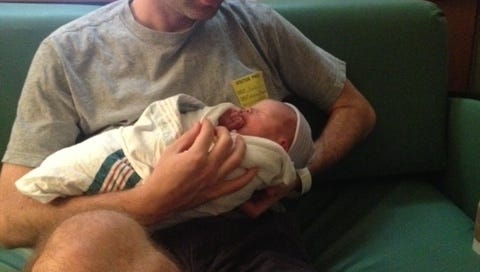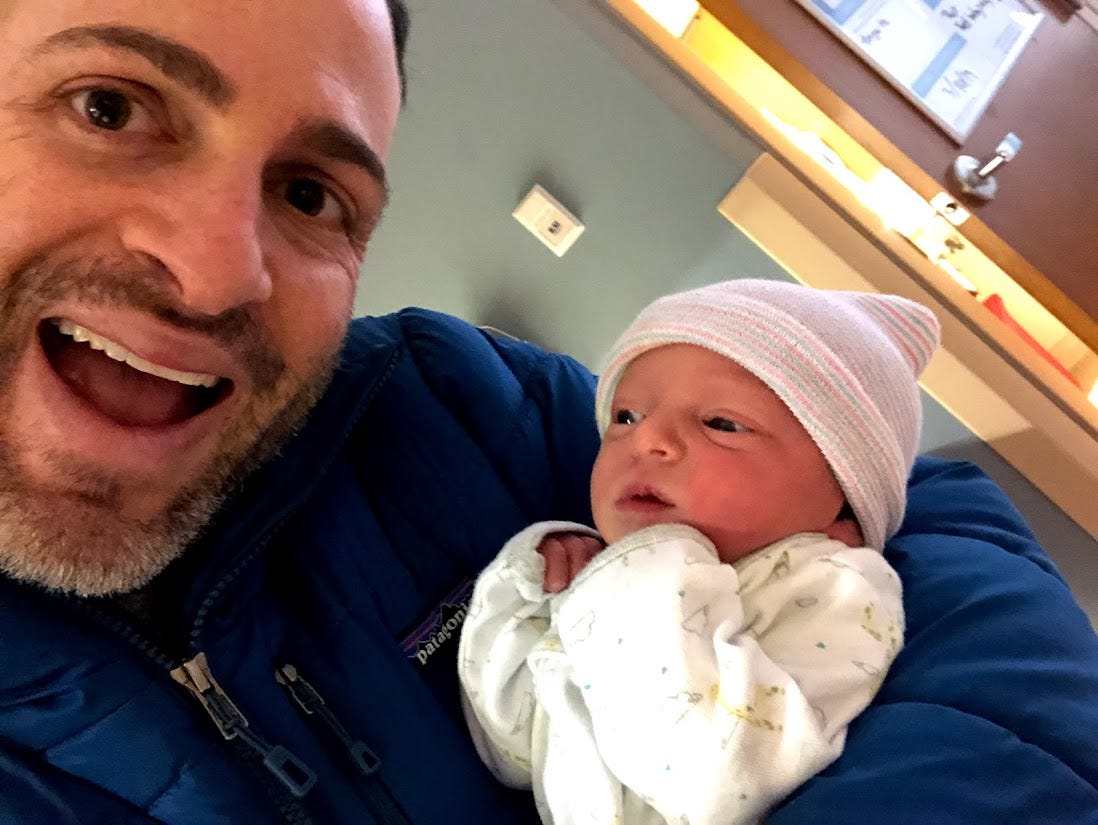A Tale of Three Paternity Leaves
A Father's Day Story of How Times Have Changed for Paid Leave
New dad Warren with our first kid in 2013 - and zero days of paternity leave.
About a decade ago, I published a story in Roll Call positing that if we wanted to get fathers a real gift on Father’s Day, we should consider offering them paternity leave. Around that time, I had put a call out to find a dad who had taken time off when his partner had a new baby and who would be willing to talk about it.
It was hard to find him. Not many men were taking leave in 2014, and even fewer were willing to go on the record and talk about it. At the time, the prevailing wisdom was that articulating your willingness to take time off work for caregiving could be seen as unambitious or vulnerable, things few ladder-climbing Congressional staffers in the early 2010s wanted to identify with.
Yet from the years 2000 to 2016, the percentage of men using leave within 12 weeks of their first child’s birth doubled, from 33 percent to 66 percent, according to data from the U.S. Census. In 1975, only about 7 percent of men took time off after the birth of a child. So when we talk about how things have changed dramatically over time with regard to caregiving expectations for men and the split between couples, we have the data to show it—and we also can have a positive outlook that this graph will continue to trend up.
In the Men and Care report, published by my colleagues at the Better Life Lab, we can see that men value being caregivers and that caregiving fundamentally changes men and their families. We also know that caregiving patterns set in a child’s first year of life can persist for many more—another important reason to give both parents time to prioritize caregiving in that first critical year. I’ve had a front-row seat to the paternity leave evolution over the past decade, witnessing how much time my spouse has taken following the birth of each of our three children. When our first child was born in 2013, my husband didn’t get paid leave, but he received a bouquet and some baby gifts with the company logo printed on them. It was such a strange thing for the company to do—a sort of a ‘Congratulations on the baby, but we aren’t actually going to give you any time off.’
Rather than summarizing this myself —given that it’s Father’s Day and all—I thought I’d pass the mic to my spouse and co-parent, Warren Margolies, and interview him about how taking paid leave (or not being able to) has shaped his parenting experience. Our conversation has been edited for clarity.
(And a quick shout out to Warren, a dedicated dad, and supportive spouse who became a father as part of the transition generation that still felt unsure how much leave dads could and should take. The reason my Substack has zero so few typos is due to his diligent proofreading).
RG: So, in August 2013, we had our first kid. We’re at the hospital at 4 a.m. on a Wednesday and our son is there by 10 a.m. Your office has no formal paternity leave policy on the books. How much time could you take off, and what was it like going back to work?
Warren: That feels like an eternity ago on so many levels. I was an in-house attorney at a commercial real estate developer, and even the term ‘paternity leave’ felt extremely new-fangled at that point. It just wasn’t an obvious part of the conversation, and the idea of a formal paternity leave policy didn’t even seem possible. So, with no actual paternity leave in place, I took sick days that Wednesday, Thursday, and Friday so that the three of us could be at the hospital together until we took our son back home. And then it was back to the office on Monday. Even writing that sounds insane, right? Which I guess speaks to how far we’ve come on this issue over the past 11 years. I didn’t even know that I should be advocating for some sort of parental leave policy because there was no ‘parental leave’. There was ‘maternity leave’.
Warren with baby #2 - and a week off this time.
RG: So, fast-forward to late winter 2015. You’re an associate at a boutique law firm but you’re not the only one expecting a kid this time. How did your workplace go about deciding how to create a policy and how much leave you could take?
Warren: There were three associates having kids in quick succession, and we got together on our own and decided this is something for which we wanted to advocate. I wouldn’t exactly call what ensued a formal policy—it still felt very much like, “We’ll offer it in this instance since you’re bringing it up.” So it started as one week off and the second week out of the office, but back on email. Which I suppose is progress, since they had never offered anything to dads previously. But the norms surrounding it still weren’t great. Maybe that’s a generational thing since a large portion of the partners skewed older. But there were some jokes made at our expense. And there were two separate partners who didn’t respect boundaries—one started sending me work by the beginning of the second week, and another one wrote an email to the effect of, “You said you’re going to start coming in again by the middle of this week, right?” And in my head, I was, of course, like, “No, I absolutely did not say such a thing.” And in retrospect maybe I could have done a better job of advocating for myself and making clear that I was taking the full second week completely off. But there’s a power dynamic at play, which makes it very tricky.
Now that I’m on the other side of that divide, I think the biggest thing I can do is make clear that I don’t want to hear from an associate during their leave. We’ll figure out how to manage. Go support your spouse and hang out with your kid.
Third time is a charm? Warren with baby #3 in 2019.
RG: So now we jump to March 2019. Even though you work in the District, we are still over a year away from D.C. having paid leave laws up and running. Our third kid is coming and you’re at a bigger law firm this time. How much leave did you actually get?
Warren: Different law firm this time around and a slightly improved policy. They gave me two weeks paid leave and, to my managing attorney’s immense credit, she not only respected boundaries throughout those two weeks but made a point to emphasize that the work would get done while I was gone and that there would be ample time to catch up on everything on the other side of my leave. Which was incredibly powerful to hear, given my previous two experiences. I guess my personal evolution as a dad each time around—2013, to 2016, to 2019—tracks the positive trends on the paternity leave front writ large.
RG: You just started a new position - congratulations! One of the first things you told me about this new firm is that they have 18 weeks of paid family leave on offer (and an additional eight weeks of unpaid). And yet, we’re at a point where we are done expanding our family. How do you feel that this new generation of employees will be affected by such generous leave?
Warren: I want to specifically shout out my new firm for doing so—I know it’s far more common than it was even a decade ago to have such a generous policy, but even so, I think it’s worth giving credit to all companies that are doing so. This should be the norm. It shouldn’t even be a question. To be double clear, don’t worry—I’m not trying to have another kid. Three is a very good number, and I feel satiated. But good on them for helping to establish this as the standard. They also give parents a full 12 months to use that allotment as they see fit, which makes an enormous amount of sense to me.
Depending on a particular family’s child care and career situations, it’s far more valuable to take that leave a handful of months in, once your spouse has finished up their leave and gone back to work. But all of these things are universally positive shifts for future dads. Paternity leave sets an example for fathers moving forward—I’m going to be around, I’m going to be changing diapers, and whatever gender norms that existed when we were kids no longer apply. And from the employer’s standpoint, it engenders so much goodwill on the part of their employees. It’s a matter of a company taking the talking points about work-life balance and actually enacting a policy that makes it a point of emphasis.
RG: Anything else you want to say?
Warren: My generation—and, for that matter, hopefully, future ones too—isn’t Don Draper. I don’t view it as a point of pride to be at the office long hours, away from my family. I want to be around everyone, helping out however I can. That’s not to say I don’t take an enormous amount of pride in my career—I do. I work my butt off. But there are times when work shouldn’t be the most important thing in a man’s life, and the weeks and months after a newborn arrives very much fall within that category. I think, for the most part, any stigma associated with opting to take the full amount of leave on offer and being unapologetic about it is largely gone. Which is an amazing thing, and as it should be.
Happy Father’s Day to all who celebrate—and here is hoping we have more stories of dads being able to present at the caregiving moments in their lives without fear of losing their jobs or facing repercussions at work.
TODAY! Come Join My Conversation with Jess Calarco
YOU are invited! I’d love to have Substack readers join me (and many others) on June 18 at 3:00 PM EDT for a virtual book talk with Jessica Calarco to discuss her new book, Holding it Together: How Women Became America’s Safety Net. Eve Rodsky, author and founder of the Fair Play Policy Institute, will introduce this fireside chat, and I’ll be the one to interview Jess. You may remember our recent conversation from the Substack last week (and our giveaway!). RSVP here.









my husband had two weeks of paid parental leave, which his union won in their newest contract right before our son was born. he works in construction, obviously a very male dominated industry, so going from 0 to even 2 weeks was huge. we're done having children but i remember how freaked out i was when he went back to work and i had to take care of this teeny tiny human all by myself. i'm grateful times are changing but it's still so slow and so rough.